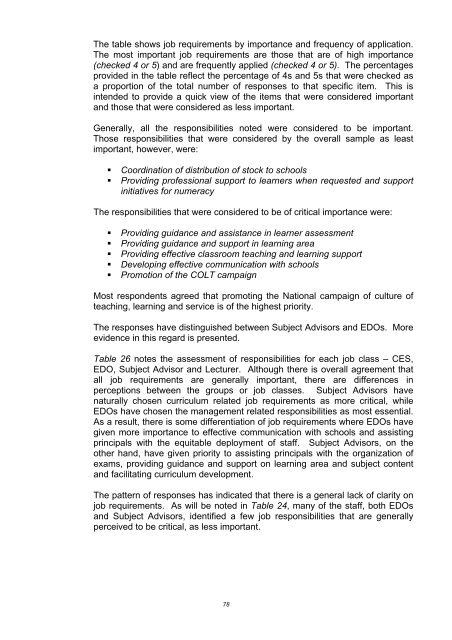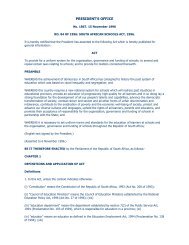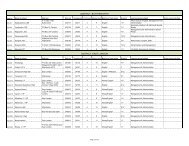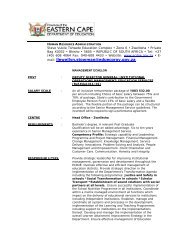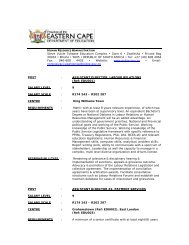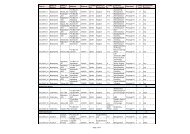Assessment of Needs and Capacity of District Office Professional Staff
Assessment of Needs and Capacity of District Office Professional Staff
Assessment of Needs and Capacity of District Office Professional Staff
Create successful ePaper yourself
Turn your PDF publications into a flip-book with our unique Google optimized e-Paper software.
The table shows job requirements by importance <strong>and</strong> frequency <strong>of</strong> application.<br />
The most important job requirements are those that are <strong>of</strong> high importance<br />
(checked 4 or 5) <strong>and</strong> are frequently applied (checked 4 or 5). The percentages<br />
provided in the table reflect the percentage <strong>of</strong> 4s <strong>and</strong> 5s that were checked as<br />
a proportion <strong>of</strong> the total number <strong>of</strong> responses to that specific item. This is<br />
intended to provide a quick view <strong>of</strong> the items that were considered important<br />
<strong>and</strong> those that were considered as less important.<br />
Generally, all the responsibilities noted were considered to be important.<br />
Those responsibilities that were considered by the overall sample as least<br />
important, however, were:<br />
� Coordination <strong>of</strong> distribution <strong>of</strong> stock to schools<br />
� Providing pr<strong>of</strong>essional support to learners when requested <strong>and</strong> support<br />
initiatives for numeracy<br />
The responsibilities that were considered to be <strong>of</strong> critical importance were:<br />
� Providing guidance <strong>and</strong> assistance in learner assessment<br />
� Providing guidance <strong>and</strong> support in learning area<br />
� Providing effective classroom teaching <strong>and</strong> learning support<br />
� Developing effective communication with schools<br />
� Promotion <strong>of</strong> the COLT campaign<br />
Most respondents agreed that promoting the National campaign <strong>of</strong> culture <strong>of</strong><br />
teaching, learning <strong>and</strong> service is <strong>of</strong> the highest priority.<br />
The responses have distinguished between Subject Advisors <strong>and</strong> EDOs. More<br />
evidence in this regard is presented.<br />
Table 26 notes the assessment <strong>of</strong> responsibilities for each job class – CES,<br />
EDO, Subject Advisor <strong>and</strong> Lecturer. Although there is overall agreement that<br />
all job requirements are generally important, there are differences in<br />
perceptions between the groups or job classes. Subject Advisors have<br />
naturally chosen curriculum related job requirements as more critical, while<br />
EDOs have chosen the management related responsibilities as most essential.<br />
As a result, there is some differentiation <strong>of</strong> job requirements where EDOs have<br />
given more importance to effective communication with schools <strong>and</strong> assisting<br />
principals with the equitable deployment <strong>of</strong> staff. Subject Advisors, on the<br />
other h<strong>and</strong>, have given priority to assisting principals with the organization <strong>of</strong><br />
exams, providing guidance <strong>and</strong> support on learning area <strong>and</strong> subject content<br />
<strong>and</strong> facilitating curriculum development.<br />
The pattern <strong>of</strong> responses has indicated that there is a general lack <strong>of</strong> clarity on<br />
job requirements. As will be noted in Table 24, many <strong>of</strong> the staff, both EDOs<br />
<strong>and</strong> Subject Advisors, identified a few job responsibilities that are generally<br />
perceived to be critical, as less important.<br />
78


